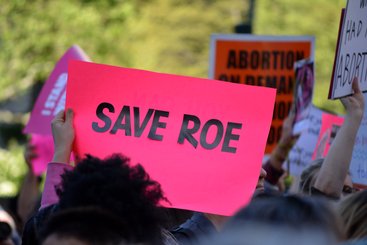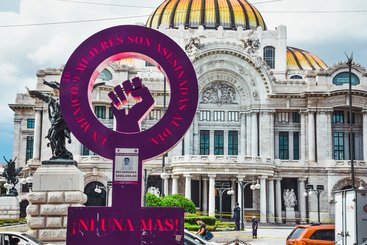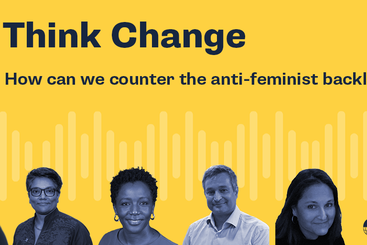Led by voices from the Global South, last month’s Women Deliver conference in the Rwandan capital of Kigali re-energised global feminist ambitions – especially for sexual and reproductive rights.
At the same time, a spotlight was shone on the shadowy anti-rights movement that is behind the backlash to gender justice, reminding us just how dangerous this patriarchal resurgence really is.
The conference achieved much of its purpose: to catalyse collective action for gender equality, create space and strengthen the feminist movement, but another objective to hold leaders accountable was challenged during its opening moments.
An anti-feminist surprise
At the Opening Ceremony, President Paul Kagame of host nation Rwanda welcomed 6,000 participants from around the world – highlighting progress towards gender equality in his country. He then opened the first plenary with invited speakers: Senegalese President Macky Sall, Dr. Natalia Kanem (Executive Director of UNFPA), leading Afghan educator Shabana Basij-Rasikh, and Hungarian President Katalin Novák.
It was Novák’s presence that stirred controversy. Her pro-natalist views soon became apparent, with her emphasis on boosting family size to counter her country’s low birth rate, rather than supporting sexual and reproductive freedoms for all. She boasted, for example, that women in Hungary no longer need to pay income tax after having four children. Her statement generated backlash in the media, as well as frustration among those at the conference, as she revealed that she was anything but feminist.
Novák is well-known for her alliance with the anti-rights movement, stance against abortion and LGBTQI+ rights, and her deep association with the populist right-wing, racist politics of Hungarian Prime Minister Viktor Orbán. In fact, to date her government has refused to sign the Istanbul Convention to protect women from gender-based and domestic violence.
Maliha Khan, President of Women Deliver, issued a swift response distancing Women Deliver from Novák’s views, stating that the Government of Rwanda had organized the opening session. But, just why the Government invited Novák to such a landmark feminist gathering remains unknown. Was the Government of Rwanda giving a nod to Africa’s anti-sexual and reproductive rights constituencies by inviting her to the plenary?
Novák’s presence in the room is yet another example of how anti-rights actors have gained political legitimacy and influence over global discourse, despite the best efforts of feminist movements.
Is the world delivering for women?
The Women Deliver Conference was one of the most important global feminist convenings since the 1990s, aiming to expand global consensus around gender rights.
The 1993 World Conference on Human Rights, 1994 International Conference on Population and Development and the landmark fourth World Conference on Women held in Beijing in 1995 have been followed by almost thirty years of silence, without any follow-up UN global conferences. Meanwhile, the anti-rights movement has penetrated every level of political power, even feminist spaces. From transnational institutions to national governance and local organisations, they have been working to stall or reverse policies to promote gender justice.
The conference organisers themselves wanted to tackle this dispiriting reality across its plenaries. Eminent scholar Neil Datta, whose report Tip of the Iceberg exposes funding behind anti-rights movements in Europe, was a strong presence. Feminist scholar Haley McEwen addressed a plenary outlining how and why the Christian right is influencing gender politics in Africa, and the grave impacts of regression on collective rights.
Research by the European Forum for Sexual and Reproductive Rights on anti-rights movements funding, actors and organisations featured across the conference. The figures were startling. Between 2008 and 2018, anti-rights actors had spent $707.2 million to influence policies in Europe, with almost 27% of this funding coming from Russian sources. On a global scale, key American NGOs, European foundations, and Russian oligarchs are collaborating to influence the political agendas in both Europe and the Global South.
At a discussion on the geo-politics of anti-rights movements and their work in East Africa, Charles Owekmeno, Country Director of the SRHR Alliance Uganda emphasised that the recent wave of anti-LGBTQI+ legislation in Africa was driven by the deliberate actions and investments of these same northern anti-rights actors.
He said they have recruited and mentored many civil society organisations, penetrated religious institutions, and have equipped politicians to relay their messages. Anti-rights actors far outstrip progressive groups in terms of funding, intimidate their political opponents and falsify the extent of their public support to ensure compliance with their agenda.
A member of the Polish Parliament, Joanna Scheuring-Wielgus, outlined rapid legislative changes in her country, leading to one of the most restrictive abortion laws in Europe. In Poland, abortion is now only legal in cases of rape or to save the life of the woman. Not only are the anti-gender organisations that pushed this reform well-funded and well-coordinated, they also attend meetings of progressive groups and keep abreast of how much data is being shared about their funding and activities.
Governments often use anti-western/anti-colonial narratives to justify the roll-back of sexual and reproductive rights across countries in the Global South, claiming they are defending their own cultural and religious values. It is argued, for example, that homosexuality is a western import, while many scholars point to how it was in fact homophobia that was exported by colonial powers.
Kenyan feminist lawyer Nyokabi Njogu, from the Initiative for Strategic Litigation in Africa, pointed out that the ‘western agenda’ decried by many politicians is in fact funding flows from anti-rights organisations that influence who gets elected, how judges are appointed, and which false narratives dominate the mainstream and social media discourse. She challenged activists to expose where the money is coming from and to reframe what the ‘western agenda’ really means.
Confronting the enemy in the room
Anti-rights actors are using the protection of family, culture and religion to justify their resistance to or reversal of reforms in family laws. The United Nations resolution on the protection of the family is a result of this backlash against universal human rights norms.
Speakers at a panel hosted by the Global Campaign for Equality in Family Law observed that politically motivated policies to entrench discrimination within the family are gaining momentum. At the current rate of progress, it will now take 286 years to close the gender gaps in legal protection and remove discriminatory laws.
In Indonesia, the Government recently passed a law making consensual sex outside of marriage a crime, exposing same-sex couples and heterosexual couples from poor or marginalised communities, who cannot provide legal proof of their marriage, to prosecution.
Why are today’s governments moving so far away from the global gender equality framework based on human rights that animated the UN conferences during the 1990s?
As Charles Owekmeno reminded us at Women Deliver, it is dangerous for parliamentarians to speak out against exclusionary new laws in East Africa, which are being fast-tracked to avoid close scrutiny. Indeed, their penetration of civil society groups is so successful it is likely that their representatives may well have been attending sessions at the conference itself. Various audience members were seen to shift uncomfortably, casting glances at their neighbours, as they listened.
His observations were a sobering reminder that the enemies of rights-based gender justice movements are already within. They are changing the language of our human rights discourse, undermining global agreements, and pushing regressive legal agendas in our countries. And now they are speaking at the opening plenaries of feminist conferences.
We can, however, credit the organisers of Women Deliver for opening our eyes to the stark reality of the backlash in our midst. Perhaps this will give activists and their funders the push they need to be bolder in their response.



